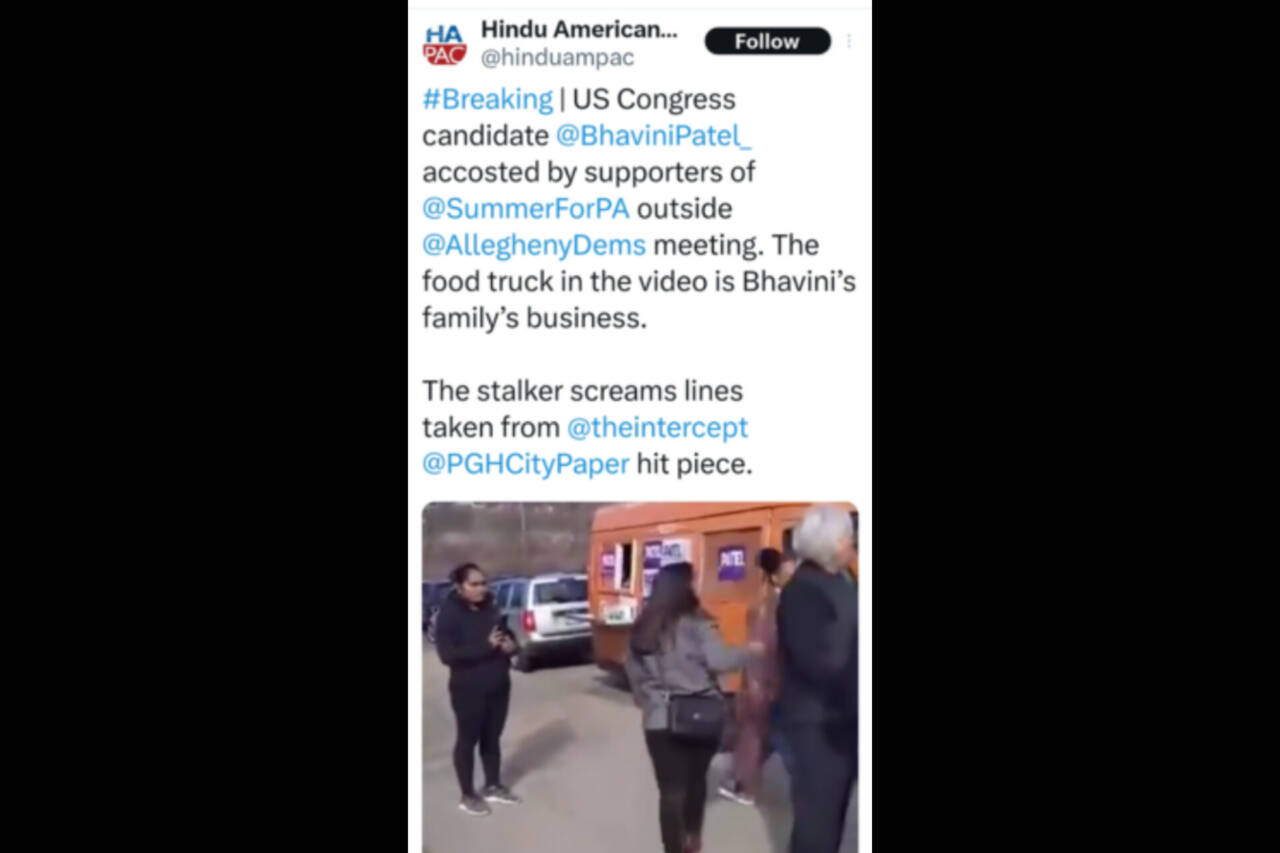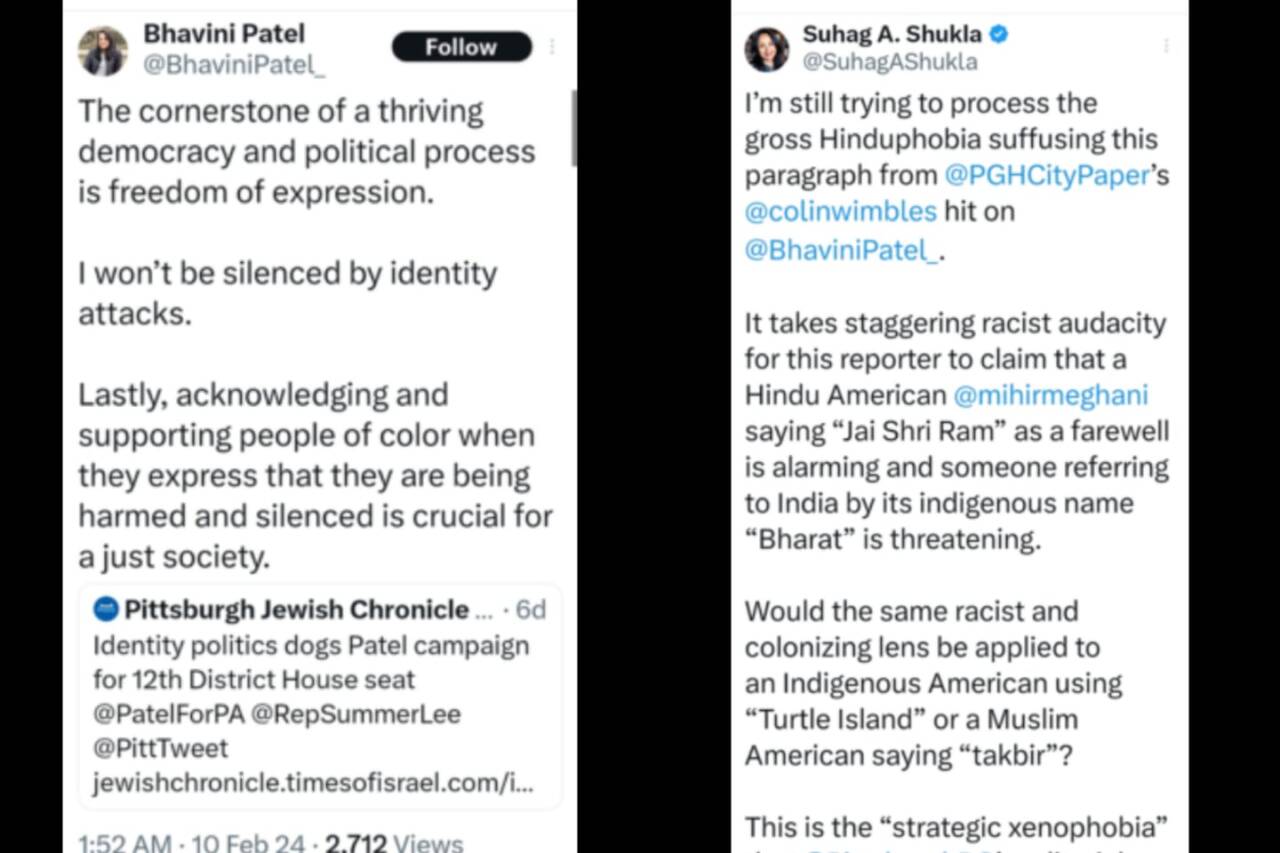The progressive activist community in the United States has faced criticism for its treatment of Hindu American politicians who embrace their Hindu identity and advocate for issues related to Hinduism or India. Figures like Vivek Ramaswamy and Tulsi Gabbard have been subjected to scrutiny and criticism for their views and affiliations, with some accusing them of not aligning with prevailing leftist ideologies.
Bhavini Patel, a newcomer in American politics and a Congressional candidate for Pennsylvania’s 12th district, has recently become a target of harassment from supporters of incumbent Representative Summer Lee. Patel’s announcement to challenge Lee in the Democratic Primary has ignited tensions, with some of Lee’s backers resorting to aggressive tactics, including verbal confrontations.
A recent incident captured on social media platform X shows Patel being confronted outside a Democratic Committee meeting by individuals shouting accusations from a media article branding her as right-wing and associating her with genocide support. Notably, the video also reveals that the food truck featured belongs to Patel’s family, adding a personal dimension to the incident.
The video depicting the confrontation with Bhavini Patel outside the Allegheny Country Democratic Committee meeting is deeply troubling and warrants attention from authorities as evidence of explicit intimidation and harassment against a first-time politician. Such behaviour should be unequivocally condemned and addressed legally, as it goes beyond the bounds of civil political discourse.
This incident, however, is just one among several instances targeting Bhavini Patel for her political views. Patel, a vocal supporter of the Jewish state, has faced criticism for her advocacy following the October 7, 2023, Hamas terrorist attack on Israel. Her statements and public appearances in support of Israel and the hostages in Gaza have drawn attention and stirred controversy.


A detailed article in the Pittsburgh Jewish Chronicle delves into Bhavini Patel’s family background and policy priorities. According to the publication, Patel is actively seeking strong federal funding to bolster various district projects, including support for small businesses, infrastructure development, transportation systems, and workforce development.
The crux of the issue seems to revolve around Patel’s pro-Israel stance, which has garnered significant support from the Jewish community in Pennsylvania’s 12th district. This support appears to have triggered resentment from some quarters, leading to reported incidents such as the cancellation of an event featuring Patel at the University of Pittsburgh. Despite assurances that the program would be non-political and focused on her experiences as a former student, the event was called off, raising concerns about the challenges faced by Patel in maintaining an apolitical stance.
The University of Pittsburgh unexpectedly cancelled Bhavini Patel’s speaking engagement, citing concerns for her safety and security amidst opposition to her policies as a US Congress candidate. The university has suggested rescheduling the event later in the year. Patel expressed disappointment over the cancellation through her social media platforms, particularly saddened by the inability to speak at her alma mater. According to reports, the University of Pittsburgh clarified that the invitation extended to Patel was part of their tradition of inviting distinguished alumni to share their experiences with current students. They emphasised that the intention was not to host Patel as a political candidate but rather to focus on her time as a Pitt alumna. However, as the event approached, logistical challenges arose, leading to the decision to cancel the event to ensure the focus remained on Patel’s alumni experience.
Recent coverage by the Pittsburgh Jewish Chronicle delves into the political dynamics surrounding opposition to Bhavini Patel. The cancellation of the University of Pittsburgh event follows a contentious Candidate Forum held at Carnegie Mellon University on January 28th, where the audience’s behaviour was described as disruptive, intimidating, and occasionally confrontational.
Bhavini Patel has taken to her X account to express her thoughts on the cancellation of her speaking engagement at the University of Pittsburgh. In her posts, she emphasises the importance of freedom of expression in a healthy democracy and asserts her refusal to be silenced by attacks on her identity. She also underscores the significance of supporting people of colour who speak out against harm and silencing, advocating for a just society.
Meanwhile, the Pittsburgh City Paper recently published an article targeting Bhavini Patel, aiming to discredit her and undermine her credentials. Titled “Bhavani Patel courts out-of-state donors with Hindu nationalist ties and pro-Israel agendas,” the article harshly criticises Patel for her support of Israel and the Modi government in India.
The article singles out a recent video call hosted by Bhavini Patel and California-based physician Mihir Meghani for scrutiny. It highlights Meghani’s support for Hindu American issues, insinuating that advocating for such causes is somehow suspect or inappropriate.
The Pittsburgh City Paper article goes on to detail a virtual event hosted by Bhavini Patel and California-based physician Mihir Meghani. The piece highlights that participants from outside Pittsburgh engaged in “vociferous praise of Israel” and expressed interest in supporting Patel’s bid against progressive Democrats, including incumbent US Rep. Summer Lee. The article also points out the discussion of Hindu nationalist rhetoric during the event. However, it is noteworthy that the article takes snippets from video callers expressing their political opinions and weaves them into a conspiracy theory, portraying them as criminal statements.
The article adopts a somewhat comical tone in suggesting that supporting Israel and condemning Hamas’s attacks or endorsing PM Modi’s government could be deemed criminal by the standards of the US woke media. It questions the legitimacy of expressing such political views and affiliations.
Additionally, the write-up challenges Bhavini Patel’s assertion that 70 percent of her campaign funding comes from within Pennsylvania. The article counters this claim, stating that during the brief call, several donors, three of whom claimed primary residence in New York, expressed support for Patel.
The article also emphasises Mihir Meghani’s role as a co-founder and board member of the Hindu American Foundation, portraying his contributions to pro-Israel lobbying groups as a revelation akin to a criminal conspiracy. It critiques the singling out of Patel due to her pro-Israel and pro-Hindu stance, highlighting that various candidates receive financial support from diverse stakeholders. The piece underscores the need for fair reporting, condemning the vilification of a candidate and her supporters based on their political beliefs.
Suhag A. Shukla, the Executive Director of the Hindu American Foundation, has sharply criticised the Pittsburgh City Paper for what she describes as a Hinduphobia article. Shukla expresses bewilderment at what she perceives as blatant Hinduphobia evident in a paragraph from the article, particularly in the reporter’s interpretation of Hindu American Mihir Meghani bidding farewell with “Jai Shri Ram” and the use of the indigenous name “Bharat” for India. Shukla questions whether the same lens of racism and colonisation would be applied to Indigenous Americans using “Turtle Island” or Muslim Americans invoking “takbir.” She highlights the concept of “strategic xenophobia” emphasised in the editorial, pointing out the targeted harassment faced by pro-Bharat Hindu American politicians in US politics. Shukla notes the selective application of “freedom of expression” by the woke media and the pressure on Bharatiya Hindu candidates to conform to Abrahamic structures of thinking, regardless of their political affiliation, which she finds deeply troubling.
As Bhavini Patel continues to face challenges in her campaign, the incidents underscore the need for a broader conversation on the fair treatment of individuals with diverse backgrounds and political perspectives in the American democratic process. The harassment and intimidation tactics should be unequivocally condemned, and efforts should be made to foster an environment where political discourse is respectful and inclusive, irrespective of one’s religious or cultural background.



















Comments